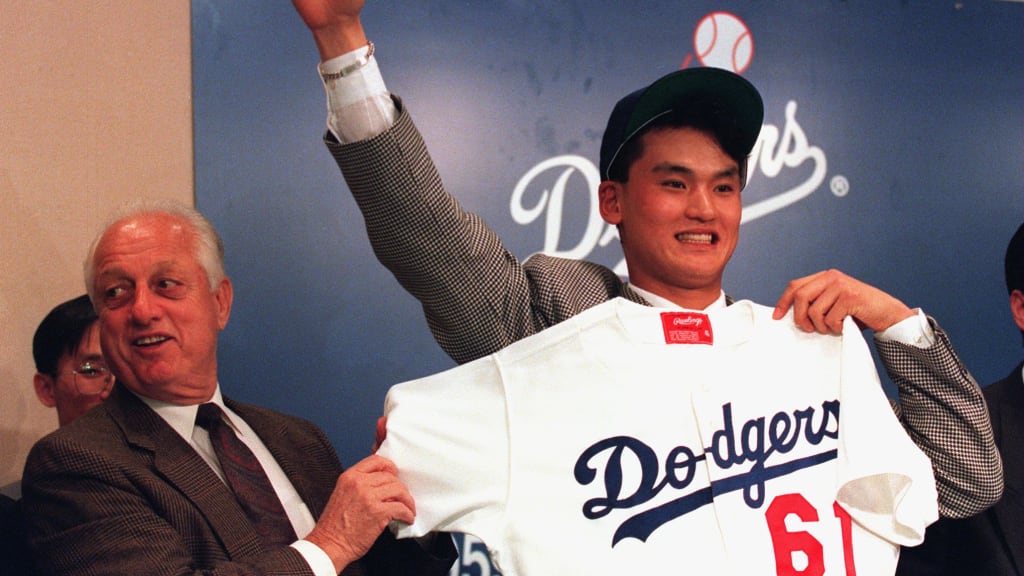
This story was excerpted from Michael Clair's International Beat newsletter. To read the full newsletter, click here. And subscribe to get it regularly in your inbox.
When the Dodgers and Padres take the field at Gocheok SkyDome in Seoul on March 20 to open the regular season, big league history will be made. For the first time ever, a Major League regular season contest will be held in Korea, home to one of the most passionate baseball fanbases and cultures in the world.
With this groundbreaking game coming up, we thought it was long past due to honor some of the Korean trailblazers who have paved the way.
First Korean-born MLB player: Chan Ho Park
It can be hard to remember the enormous impact Park made when he signed with the Dodgers while he was a sophomore at Hanyang University in Seoul before the 1994 season. The L.A. Times called it “Chan-Ho Mania,” while Tom Byun of the English edition of the Korean Times said, “From elementary students to old people, there’s much interest in Chan Ho Park." The newspaper even sent a reporter to Vero Beach, Fla., for Spring Training for the first time that year.
Expected to pitch in the Minors that season, Park’s Spring Training performance quickly earned him a spot on the big league roster. On April 8, 1994, he made his big league debut when he entered in the ninth inning of a 6-0 loss to the Braves -- his debut getting overshadowed by Kent Mercker’s no-hitter.
Park would go on to have a productive 17-year MLB career, earning election to the All-Star Game in 2001 and winning 124 games -- still the most by a Korean-born player in MLB history.
First Korean-born position player: Hee-Seop Choi
Signed to a $1.2 million contract with the Cubs following South Korea’s second-place finish at the 1998 Baseball World Cup, Choi was one of the game’s biggest prospects as he moved through Chicago’s Minor League system. While he would display light-tower power in the Minor Leagues, crushing 26 home runs in Triple-A in 2002, big league pitchers were able to exploit a hole in his upper-cut swing with a steady diet of breaking stuff. Still, Choi finished with 40 career big league homers and became a cult hero for his time with the Marlins.
First Korean-born player to win a World Series: Byung-Hyun Kim
Armed with a frisbee slider and rising fastball, the submarining reliever may have been scapegoated for blowing leads in Games 4 and 5 of the 2001 World Series, but he was a crucial member of the D-backs bullpen all season long. That year, Kim saved 19 games with a 2.94 ERA before doing even better in 2002 -- posting a 2.04 ERA with 36 saves.
First Korean-born position player to reach the All-Star Game: Shin-Soo Choo
No matter how you slice it, Choo is atop the leaderboards for Korean-born MLB players. He leads in WAR (34.6), home runs (218), hits (1,671), and stolen bases (157). An all-around star with one of the sharpest batting eyes in the game -- Choo finished his big league career with a .377 OBP, the same as Hall of Famers Fred McGriff and Derek Jeter -- Choo returned to play in the KBO in 2021 and recently announced that this upcoming season will be his last.
Largest contract for a Korean-born player: Jung Hoo Lee
He’s yet to make his MLB debut and he’s already got a record to his name: When the Giants signed the outfield phenom earlier this winter to a six-year, $113 million contract, it broke Hyun Jin Ryu’s record of a four-year, $80 million deal he signed with the Blue Jays in 2019 (Ryu will be returning to the KBO after signing an eight-year deal with the Hanwha Eagles this winter) and Choo's seven-year, $130 million contract he inked with the Rangers in 2013.
It’s not hard to see why Lee earned the deal: Just 25 years old, Lee is an exceptional all-around athlete, hitting .340 for his career in the KBO with 65 home runs and 69 stolen bases.
First American-born player to play for Team Korea: Tommy Edman
While many U.S.-born athletes have gone to play in the KBO over the years, the Cardinals' second baseman made history last spring when he joined Team Korea for the World Baseball Classic. Though Korea’s tournament may not have gone as planned as they failed to advance out of the group stage, Edman's place in history is secure.
Michael Clair writes for MLB.com. He spends a lot of time thinking about walk-up music and believes stirrup socks are an integral part of every formal outfit.
